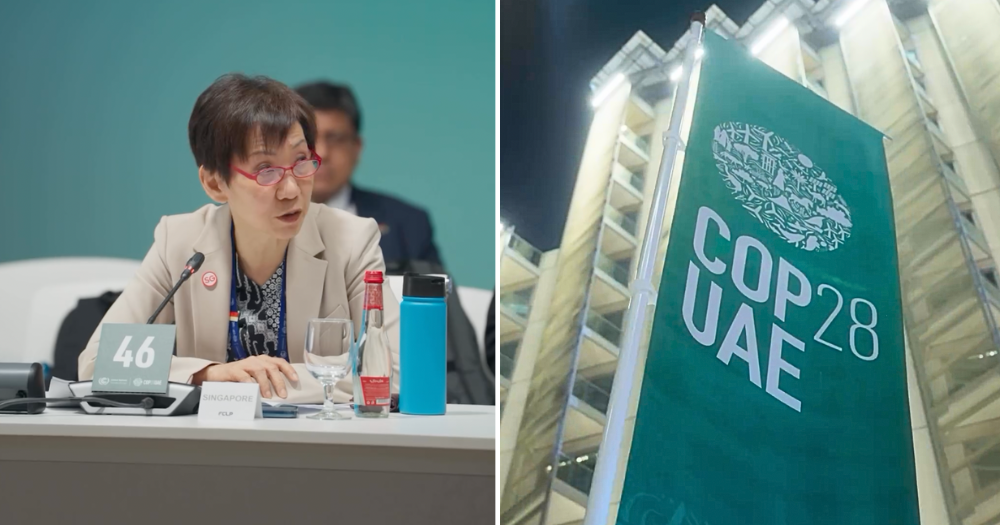COP28, the annual United Nations (UN) climate conference, ended with a landmark deal calling on countries to transition away from fossil fuels.
The deal, which is called the UAE Consensus, also included targets to triple renewable energy capacity and double energy efficiency globally by 2030.
Singapore co-facilitated negotiations on mitigation at COP28, and facilitated the first Global Stocktake, a review of the collective progress that has been made towards achieving the goals of the Paris Agreement.
Singapore's climate goals are aligned with the UAE Consensus, Minister for Sustainability and the Environment Grace Fu affirmed on Jan. 10 in parliament.
In response to a parliamentary question by Member of Parliament (MP) Liang Eng Hwa on the overall outcomes of COP28, Fu also noted the significant achievements that came out of the conference.
Major achievements at COP28
Fu highlighted the fact that COP28 took place amidst an uneasy climate:
"I think we must look at it in the context that it's being held. It's being held in a period where there's high energy inflation. There's also great geopolitical contention. But the fact that all parties were able to come together and again reaffirm that COP, UNFCCC (United Nations Framework Convention on Climate Change), is the only relevant multilateral platform for climate discussions and negotiations, I think it's a major undertaking."
Furthermore, Fu pointed to the language used at COP28 as being unprecedented — it is the first time in history that a UN climate deal has referenced transitioning away from fossil fuels.
Fu stated:
"But more importantly, is that with a Global Stocktake, there was a louder call and more concerted call to accelerate action in this decade. Because climate projections, temperatures are telling us that we need to do more in the near term. And the focus on global stocktake actually has a lot been [about] implementation.
I think what the member [Liang] has spoken about, whether it's three times renewable, two times on energy efficiency improvements, these are really going into, so called, the nitty gritty. It's no longer just setting net-zero targets, but really, what is the pathway to [keeping warming to within] 1.5 degrees [celsius]. There were some very specific recommendations and agreements. I think that's a major achievement of COP28."
Fu said merely talking about the results of COP28 in her answer to the supplementary question in Parliament would not do the matter justice, and said it "deserves a much more extensive discussion".
No decision yet on adopting nuclear energy
Liang also asked Fu about the government's position on nuclear energy, since countries such as the U.S. and Japan endorsed declarations during COP28 to increase nuclear energy capacity.
"These declarations outside the negotiation document is helpful, because these are the initiatives that are pushing movements and directions and developments in technologies in finance, and in global action," Fu said.
However, Fu stated that Singapore has not made a decision on adopting nuclear energy.
Instead, advanced nuclear energy is an area of interest for Singapore to "understand", and to leverage on its developments, as it "offers [Singapore] some potential".
In addition, Fu acknowledged that "there's better safety in these technologies", as well as in terms of its costs and competitiveness.
As such, Singapore is "building capabilities" to better understand how these technologies can benefit the country.
Singapore's efforts
As part of its Long-Term Low-Emissions Development Strategy (LEDS), Singapore has committed to achieving net-zero emissions by 2050, Fu said.
To do this, carbon taxes here have been raised to S$25 per tonne of emissions for 2024 and 2025, and will progressively increase to between S$50 to S$80 per tonne by 2030.
Singapore has also doubled its solar power deployment since 2021 to over 1,000 megawatt-peak currently, with the aim of reaching a target of at least 2,000 megawatt-peak by 2030.
Fu added that the government issued conditional approvals for the import of low-carbon electricity, which includes electricity powered by wind energy, from Cambodia, Indonesia and Vietnam.
These projects will meet about 30 per cent of Singapore's electricity needs when implemented.
Additionally, Singapore is exploring the potential of other low-carbon technologies.
"Accelerating the energy transition in Singapore will require a whole-of-nation effort," Fu said, but acknowledged that no country can tackle climate change alone.
She continued:
"Despite our natural limitations in size and natural resources, Singapore is committed to do our part as a responsible global citizen, and will continue to work with like-minded countries and companies for a cleaner, greener future."
Singapore will not be contributing to loss and damage fund
Fu announced during COP28 that Singapore will not be claiming from the loss and damage fund, a fund which will compensate developing countries vulnerable to climate change in the form of grants.
The fund recognises the responsibility of developed countries, who contributed to climate change, to developing countries, who are experiencing its consequences.
When Workers' Party MP Louis Chua asked Fu if Singapore will be contributing to the fund, Fu said no.
"We don't think that our current capacity or our resources will be meaningful in contributing grants in loss and damage."
Nevertheless, Fu emphasised that Singapore will instead support other countries, particularly vulnerable small island states, in claiming from the fund, something which she announced during COP28 as well.
"We believe that we can play a role to facilitate, to develop capabilities, to do technological sort of transfers, capability building, capacity building. That's where Singapore's strengths and Singapore's role as a financial centre can play."
She added:
"But if the member [Chua] would like to suggest a sum to the government to contribute to [the loss and damage fund], I would really welcome his suggestion."
Earlier in 2023, Fu said in parliament that Singapore had yet to decide if it will contribute or claim from the fund.
More on COP28
Top photo from Grace Fu / IG
If you like what you read, follow us on Facebook, Instagram, Twitter and Telegram to get the latest updates.



